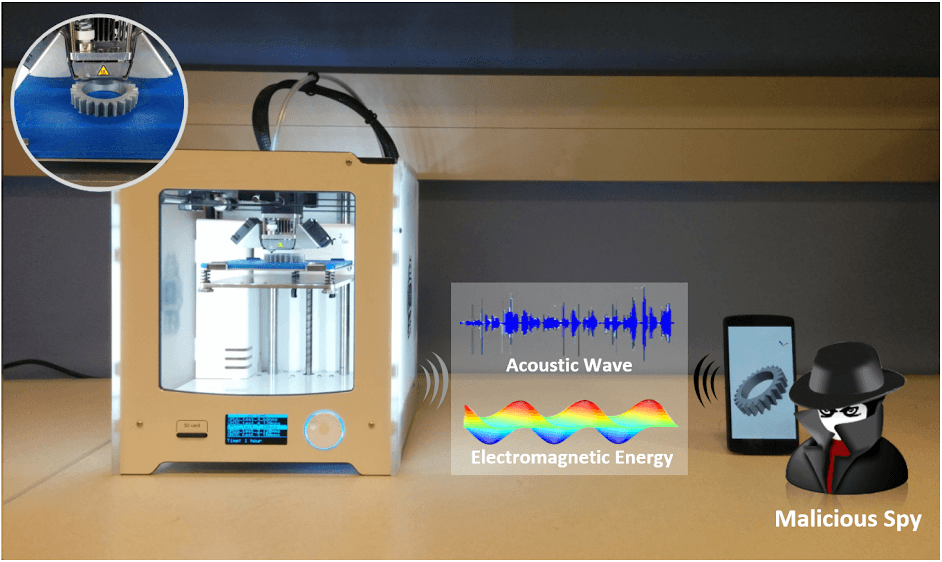Sep 9 2016
 An illustration of a smartphone hacking a 3D printer. Credit: Wenyao Xu.
An illustration of a smartphone hacking a 3D printer. Credit: Wenyao Xu.
A new study from the University at Buffalo reveals that the omnipresence of smartphones and their advanced gadgetry make them a perfect device to steal sensitive information from 3D printers.
The study explores the security vulnerabilities of 3D printing - also known as additive manufacturing - that could become a multibillion-dollar industry used to develop all things from rocket engines to heart valves.
Many companies are betting on 3-D printing to revolutionize their businesses, but there are still security unknowns associated with these machines that leave intellectual property vulnerable.
Wenyao Xu, PhD, Assistant Professor, University of Buffalo
In October, Xu and partners will present their study, “My Smartphone Knows What You Print: Exploring Smartphone-based Side-channel Attacks Against 3D Printers,” at the Association for Computing Machinery’s 23rd annual Conference on Computer and Communications Security in Austria.
Not a Cyberattack
Unlike most traditional security hacks, the investigators did not simulate a cyberattack as most 3D printers include a wide range of features to foil these types of attacks, such as watermarks and encryption. Instead, they programmed the built-in sensors of an ordinary smartphone in order to measure the electromagnetic energy as well as acoustic waves that come from 3D printers.
These sensors have the capacity to detect the location of the printer’s nozzle as it moves to produce the three-dimensional object that it is printing.
At 20 cm away from the printer, the smartphone was able to gather sufficient data to allow the investigators to replicate printing of a simple object, like a door stop, with an accuracy rate of 94%. However, the accuracy rate for complex objects, like a medical device or an automotive part was lower, but still over 90%.
The tests show that smartphones are quite capable of retrieving enough data to put sensitive information at risk.
Kui Ren, PhD, Professor, University of Buffalo
According to investigators, the bulk amount of information was obtained from electromagnetic waves, which accounted for nearly 80% of the useful information, while the remaining information was extracted from acoustic waves.
The results are very important as they reveal how anyone with a smartphone, from an industrial spy to a disgruntled employee, may be able to steal intellectual property from an unsuspicious business, particularly “mission critical” businesses where one system’s breakdown can seriously affect the entire company.
Smartphones are so common that industries may let their guard down, thus creating a situation where intellectual property is ripe for theft.
Chi Zhou, PhD, Assistant Professor, University of Buffalo
Making 3-D Printers More Secure
The investigators suggest several options to secure 3D printing. The simplest option to prevent an attack is to keep smartphones a significant distance away from 3D printers.
According to the study, the ability to get accurate information for simple objects reduced to 87% at 30 cm, and 66% at 40 cm.
Another option is to boost the speed of printing. The investigators stated that new materials could allow 3D printers to operate faster, and consequently, make it more challenging for smartphone sensors to pick up the movement of the print nozzle.
Other options include hardware-based solutions, such as electromagnetic and acoustic shields, and software-based ideas, such as programming the printer to function at different speeds.
Other authors involved in this study include Feng Lin, PhD, research scientist, and Zhongjie Ba and Chen Song, PhD students, all in the Department of Computer Science and Engineering at UB’s School of Engineering and Applied Sciences.